To ensure you have a strong and successful marketing strategy, it’s imperative you’re targeting the right audience in those campaigns. Some businesses will benefit more from a broader audience, while others can find success targeting a local audience.
While consumers are doing a majority of their shopping online and through their phones, a large amount of their time is being spent searching for products and services near them. Social media, geo-targeting, and convenience are partly to blame for this, but consumers are naturally becoming more invested in their communities — and it’s showing.
Whether you’re a brick-and-mortar, family-owned business, or corporation looking to gain exposure in a specific area, knowing how to target a local audience effectively can bring significant benefits to your marketing strategy.
Below, we’ll outline the three most essential tactics — local SEO, Google My Business, and location pages — to not only reach a local audience, but to capture that audience and convert them into potential leads for your company. Let’s get started!
Local SEO
Local SEO is your company’s bread-and-butter when it comes to reaching local audiences organically. By using local keywords throughout your website and social media, search engines will start to prefer your business over others when displaying your information in searches.
Did you know that almost half (46%) of all Google searches seek local information and nearly all (97%) search engine users have searched for a local business before? Those statistics might surprise you and it’s the reason why local SEO has never been more important.
Google My Business
Google My Business is similar to local SEO in the sense that it will help you get noticed on Google, but it’s different from having your meta information displayed in a search. Instead, Google My Business allows you to manage how Google displays your company in Google Maps searches.
This is where you get an interactive way of giving users your hours of operation, location, contact information, and website link so they can easily connect with your business. Combining local SEO with an effective Google My Business strategy will go a long way in receiving organic leads.
Location Pages
Many businesses will have stores open in several different cities, which can make local SEO difficult. An effective tactic making marketing wizards utilize are location pages. These will resemble the information given on your official website but will display it on a new page that is optimized for local SEO.
These can become extremely handy when running local marketing campaigns because it will give your audience that personal touch we know they all love when shopping. Whether you have two different locations you serve or 50+, location pages can easily help you narrow your audience.
If you’ve been struggling to implement a local marketing strategy that works for your business, contact Web Rocket Media today. We have a team of professionals ready to maximize your local efforts and expose you to the right audience.
References
Chamberlain, Lauryn. “56 Percent Of Local Retailers Haven’t Claimed Google My Business Listing.” GeoMarketing by Yext, 15 Nov. 2016, geomarketing.com/56-percent-of-local-retailers-havent-claimed-google-my-business-listing.
Walker-Ford, Mark. “12 Local SEO Stats Every Business Owner and Marketer Should Know in 2019 [Infographic].” Social Media Today, 26 Feb. 2019, www.socialmediatoday.com/news/12-local-seo-stats-every-business-owner-and-marketer-should-know-in-2019-i/549079/.

